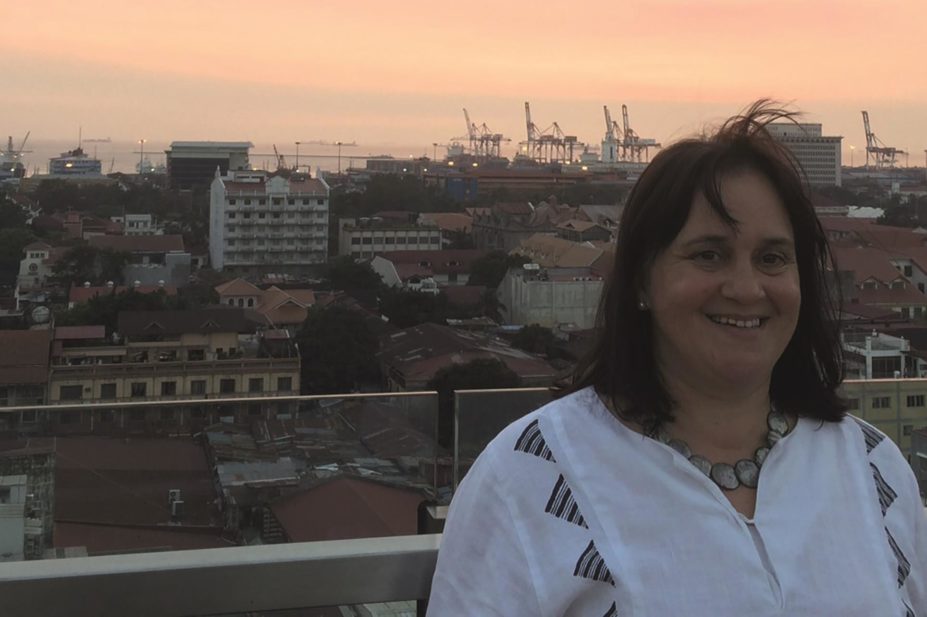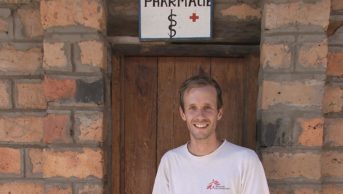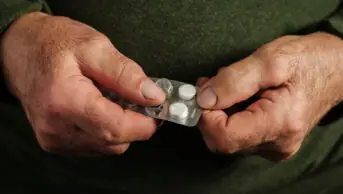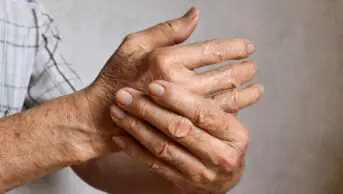
I
t was while working in a hospital in Johannesburg, South Africa, in 1989 that Trudi Hilton realised the valuable contribution UK pharmacists could make in other countries. Although she had only completed six months of pre-registration training in a hospital at the time, she believed that her knowledge and skills were more advanced than the staff there. The health system was also not as developed as in the UK. “They were still putting tablets in little plastic packets whereas we had generated labels by computers, so for me it was an eye-opener. From that point on, I was determined that I would go back and work in a developing country or in a health system with poor resources,” she says.
Although she would eventually realise this goal, Hilton went on to have a career in the NHS spanning 20 years first. She began work as a hospital locum, before practising in a general hospital and finally beginning a career at a South London and Maudsley NHS Foundation Trust in mental health.
Hilton then spent ten years in mental health pharmacy, becoming chief pharmacist at West London Mental Health NHS Trust, “but always hankering to get back in the field”.
Becoming a humanitarian pharmacist
It was at this point that she was invited to sit on the board of a charity called International Health Partners (IHP), which donates new medicines from drug companies, warehouses and wholesalers in Europe and North America into developing countries. Hilton explains: “They wanted somebody on the board to guide them in their processes and to equip the recipients, because the biggest issue when you give a donation is whether or not the recipient country has the capacity to handle it.” With the charity, she travelled to both Pakistan and Gambia twice in her first year. “I was using up all my annual leave to go and see these places and I thought, the potential here is absolutely huge,” she says.
In 2011, when IHP invited her to join as a staff member, Hilton decided to seize the opportunity. “I thought I would meet other people working in that sector and learn from them, because in the NHS we have such a good peer group,” she says. However, she discovered that there were none. “There were no pharmacists working in NGOs in the UK. You’ve got Save the Children, Red Cross, and Merlin — absolutely no one had a pharmacist,” she says, explaining that organisations instead had logisticians managing their medicines for them. “I basically learnt from people in the field, because there was no one here to make it easy for me,” she adds.
Hilton explains that every country has different challenges and tensions to consider, including getting medicines through customs and an indigenous skill set. She adds: “Ethiopia has such a good medicines programme in the country that they don’t want donations because it’ll undermine them.” She also explains that providing humanitarian aid can sometimes be controversial in itself. “There’s one argument that says humanitarian aid perpetuates need because, as long as a government can get the aid from outside, they don’t invest,” she says. “[Humanitarian aid] is not necessarily the best solution in some situations, but it’s hard to say no.”
Disaster in the Philippines
Hilton’s position was made redundant from IHP at the end of 2014 and she has since set herself up as a consultant for humanitarian aid and development. She explains that she has “made myself a plan for three years to say yes to every opportunity that comes my way”, while still trying to make a living.
Because the whole community was affected, they stick together and support each other
Her first placement as a World Health Organization (WHO) consultant was in the Philippines from January to March 2015, where she was asked to work after the typhoon disaster. “The funding after the typhoon meant that we could do a mental health project. The idea was that people affected by a disaster must be very depressed and they’ve probably got post-traumatic problems — and that wasn’t what we found at all. Because the whole community was affected, they stick together and support each other, on the whole,” Hilton says.
However, she explains that they discovered there had never been a mental health service in the region. “People with chronic mental illness were physically restrained by their families… and they couldn’t engage with society.” The patients were put on a programme of medication and, after only two months, began re-integrating with society. “It is amazing, it makes me cry because it’s so incredible,” she says.
Once they had started training local practitioners to recognise mental illness, they encountered further problems because there were no medicines available, so Hilton helped them to improve the supply chain. However, now the funding for the project has finished, her role in the programme is likely to be over. She says that getting used to life as a consultant is going to be challenging. “I’m going to have to get used to doing these little projects, totally immerse myself in it, and then it’s all over,” she explains.
Finding jobs for pharmacists
There is a limited number of jobs in the field. Global pharmacist Kate Enright is now working for Save the Children in the UK and, together, Hilton and Enright are aiming to raise the profile of the importance of pharmacists where medicines are deployed. “Some agencies spend millions on medicines and they write a lot of it off. They don’t necessarily have guidelines to make sure it’s appropriately used, so we think we can add a lot of value with just one pharmacist per organisation,” Hilton says.
She explains that, since the 2010 earthquake in Haiti, WHO has said that every country that deploys a foreign medical team must register those people before they come. In the UK, volunteers must be listed on the UK international emergency trauma register. “I have worked with the UK register to get pharmacists on it because, until that point, there weren’t any,” she says. Working with the Royal Pharmaceutical Society (RPS), she established the Humanitarian Aid and Response Network (HARN) on the RPS website, which now has 115 pharmacists and pharmacy student members.
Preparing for the challenge
Because of the lack of jobs, there are few training opportunities available for those who want to do humanitarian work. However, Hilton highlights a useful online course run by the UN Department for Safety and Security (UNDSS). “It talks you through awareness of risk. Some of it is obvious but you may not have thought of it,” she says. “If you’re staying in a hotel, try to get a room between the second and the seventh floor because you’re above any incident outside the hotel, but the seventh is the extent of the fireman’s ladder to get you out in a fire. But it also talks about hostage taking — they do big risk issues and they do small risk issues.”
Additionally, those who sign up to the UK register undertake pre-deployment training where they go away for the weekend, meet other professional groups who are going to be deployed and do an “under canvas”. “They have, in a warehouse, what they will put in a container and ship,” Hilton explains. “You have to put it together into a field hospital in the course of a weekend and then sleep on the ground. I went to the first one and they were working out how to set up the hospital, but each time they do it it’s getting more and more refined.”
During the scenario training, the candidates are radioed every hour and told that a meeting is required or there is a critical issue, such as a bomb threat, she says.
Personal danger
Although Hilton stresses she has never been in any danger on a placement, there have been times when she has felt fearful. When she visited the Philippines for the first time, she was warned that a typhoon was approaching. “I was with WHO so they were always going to evacuate me. But you suddenly realise how vulnerable you are, because you can’t fly if the weather is bad.” She explains that, during the first typhoon, local people were moved to evacuation centres but the storm was worse than anticipated. “A 20-foot wave came over and drowned everyone in the evacuation centres,” she says, “so that was probably when I was most fearful because I just didn’t know what to expect.”
You suddenly realise how vulnerable you are, because you can’t fly if the weather is bad
She adds that there have also been times when she has felt unsafe, particularly in South Sudan because the country is unpredictable. “There was some unrest anyway in the country and they had a lot of landmines remaining, so you drive along the road and you see white stones that warn you it’s a landmine territory. Then you see a 14-year-old boy with an AK47 guarding his goats. And then you have random roadblocks set up by security teams from each village who are drunk and who can ask you for anything at gunpoint.”
Other ways to get involved
For those that cannot or do not want to do field work, Hilton suggests getting involved in other ways. She says: “Some of the pharmacists in the UK helped the Department for International Development response to Ebola by looking at treatment options. People with Ebola are dehydrated, vomiting and may have diarrhoea at the same time, so that restricts the medicines that can be given orally or rectally. They were trying not to give IVs because of the risk of transmission. So through the UK Clinical Pharmacy Association network, a medicines information team in a London hospital looked at treatment options and made recommendations. They did it over 24 hours, they didn’t have to pack their bags and leave their families and risk Ebola, but they made a difference.”
For Hilton, the motivation lies in being needed. “Is it too corny to say that you can make a lot of difference with a very little intervention?” she asks. “When you work in the UK everything is organised and it runs smoothly. When you go to another place and it’s not running so smoothly, there’s real room for improvement and you can be part of the solution.
“You can make a difference and you meet incredible people. They do say, though, that humanitarians are either mercenaries, missionaries or madmen,” she laughs. “I’m nearly 50, and to do this at this point in my career when most people are having a regular job — it’s quite exciting. I never know what’s coming next.”


